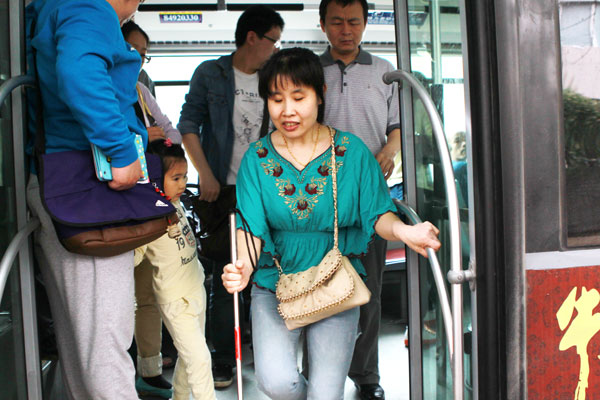Petition seeks travel help for visually impaired
 0 Comment(s)
0 Comment(s) Print
Print E-mail China Daily, June 7, 2013
E-mail China Daily, June 7, 2013
Blind people are having to wait longer for buses, and can even risk their lives taking a journey in China's cities, according to a petition signed by more than 400 visually impaired individuals and activists and sent to public transportation authorities in six major cities on Thursday.
 |
|
Wang Ying, a blind Beijing resident, exits a bus in the capital on Thursday, the National Eye Health Day. [Photo/China Daily] |
The petition calls for more user-friendly conditions for the country's 12.6 million visually impaired about a year after China introduced a law requiring such access.
Wang Rui, a blind activist from Qingdao, Shandong province, said the difficulties she faces in daily life prompted her to launch the campaign.
"I am a very independent person, but I find it impossible to get on the bus I need without others' help," the 28-year-old said.
"There is no broadcast system for buses in Qingdao, so I never know whether the coming bus is the one I want or not,," she said.
Wang said she collected 402 electronic signatures from blind people and their families nationwide for the petition.
Fu Long, a blind massager from Zhengzhou, Henan province, said taking commuter buses between his home and workplace is an adventure.
"Buses usually stop outside the bike lane and I have to cross the lane to get on the bus, so I often get hit by bikes," he said.
When he finally makes it on a bus, Fu faces other awkward situations, such as falling or knocking people over when the bus moves on a bumpy road.
The Chinese government has paid more attention to helping people with disabilities use public transportation since 2012, when the State Council issued regulations on providing more user-friendly facilities.
Several cities, including Guangzhou, Shenzhen, Chengdu and Fuzhou, have piloted an audio guiding system for the blind on a limited number of buses.
Chen Zhaoxi, a salesperson in Shenzhen, said he can easily get on a bus with the help of a sensor application on his cellphone. With a special cellphone, Chen can hear the audio guide, which tells him the number and route of an approaching bus.
When he hears his bus is coming, he presses a button that will send a wireless signal to the bus installed with the audio guiding system. Then the external speaker will send out a prompter to remind the driver to wait for a blind passenger. Chen can follow the audio instructions that tell him the position of the bus and how to get on it.
Li Weihong, vice-chairman of the China Blind Persons' Association, said the difficulty blind people have getting on the right bus is one of the biggest complaints he has heard from blind people in most cities.
Li urged city governments to include the cost of installing audio guiding systems for the blind in government budgets. Such systems usually cost around 700 yuan ($114) for each bus.
"For city like Beijing, there are more than 20,000 buses. The cost is not small, so the government should think about subsidizing public-transportation companies for installing audio guiding systems for the blind, and providing a free remote control or free cellphone applications to blind people to make a barrier-free environment a reality for all," he said.






Go to Forum >>0 Comment(s)